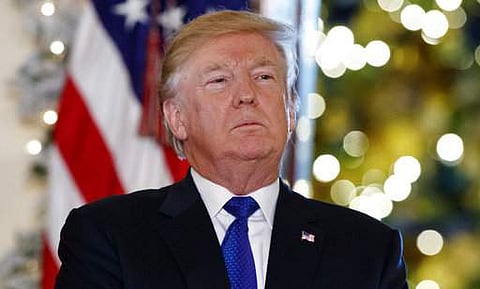

NEW DELHI: The US on Thursday announced the suspension of at least $2 billion in security assistance to Pakistan until it “takes decisive action” against militant groups “destabilising the region”. This follows President Donald Trump’s first tweet of the New Year, in which he accused Pakistan of ‘lies and deceit’ and threatened to cut off all aid. Earlier on Thursday, the US placed Pakistan on a special watch list of nations that severely violate religious freedom.
Though State Department spokesperson Heather Nauert did not disclose a specific figure, sources said the $2 billion included $255 million in military aid withheld last year and $900 million in Coalition Support Funds for 2017, which the US pays Pakistan for the cost of its counterterrorism operations.
However, “There may be some exceptions that are made on a case-by-case basis if determined to be critical to national security interests,” she said. She made it clear that these suspensions were not permanent and the funds could be reinstated the moment Pakistan “takes decisive action against (terror) groups, including the Afghan Taliban and the Haqqani Network”.
“What Trump said was a great insult to Pakistan,” Islamabad-based political analyst Mohammed Shehzad said. “Now Pakistan should learn a lesson: that it has to stand on its own feet. It claims to be a nuclear power, it also claims to be a custodian and an impregnable citadel of Islam. But see how easily it can be insulted, harassed, threatened and bullied by a president of the US, via a tweet, after he’s taken a few extra ‘sundowners’.”
“Trump is trying a coercive strategy against Pakistan,” said Rahul Bhonsle, director of strategic consultancy firm Security Risks Asia. “This is not new, but the situation has changed in Pakistan. As they have other options for seeking aid, mainly China, which is already funding the CPEC, they can dovetail some of their military needs with China.”
Bhonsle also believes that Islamabad is unlikely to use the logistics card by blocking US supplies to its troops in Afghanistan, which are routed through Pakistan. “This time the impact is minimal. Because the number of troops there is about 14,000 Americans and about five or six thousand NATO troops, whereas in the past it was about 1.5 to 16 lakh troops.
The huge American development programme in Afghanistan has also been cut back, to almost 15 to 20 per cent. So any blockage by Pakistan is not going to be effective as it was in the past. I don’t think they will try to use the blockage card, because in that case the Americans will come down very heavily, and I don’t think even China is going to encourage them to do this, because that could in turn impact the CPEC and lead to other issues.”
According to data maintained by the Security Assistance Monitor, an NGO which tracks and analyses US security sector assistance programmes, security aid to Pakistan fell sharply from about $1.6 billion in fiscal 2003 to $319.7 million by fiscal 2017. Pakistan also received $422.5 million in economic and development aid in fiscal 2017, which is unaffected by Thursday’s announcement.
“We can’t continue to have a relationship that has business as usual with Pakistan,” senior state department officials told journalists in Washington. “There have been concerns about Pakistan’s nuclear program; we have concerns about the ability of anti-India groups like LeT and Jaish-e Mohammed to fundraise and operate; and Hafiz Saeed, the head of LeT, who was recently released from house arrest,” an official said.
Nothing to do with Hafiz Saeed: US
The US said it is concerned about the release of Mumbai terror attack mastermind Hafiz Saeed from house arrest in Pakistan, but made it clear that it has got nothing to do with the suspension of at least $2 billion in security aid to Islamabad.
Pakistan hits back
Reacting to the US freeze, the Pakistan Foreign Office said, “Arbitrary deadlines, unilateral pronouncements and shifting goalposts are counterproductive in addressing common threats.”
US could freeze almost USD 2 billion in aid to Pakistan: Senior official
US-Pakistan ties can no longer bear weight of contradictions: US National Security Advisor
Pakistan says US military aid suspension counterproductive, Afghanistan welcomes the move
US can make Pakistan walk the talk on ending state support to terrorists: Expert
Pakistan's double game can end with six steps: Former-US envoy